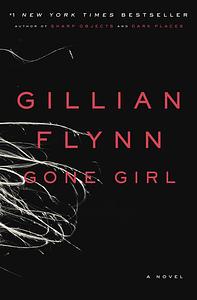Take a photo of a barcode or cover
adventurous
dark
emotional
mysterious
tense
medium-paced
Plot or Character Driven:
A mix
Strong character development:
Complicated
Loveable characters:
No
Diverse cast of characters:
No
Flaws of characters a main focus:
Yes
dark
mysterious
tense
medium-paced
Plot or Character Driven:
A mix
Strong character development:
Complicated
Loveable characters:
No
Diverse cast of characters:
No
Flaws of characters a main focus:
Yes
dark
mysterious
medium-paced
Plot or Character Driven:
A mix
Strong character development:
Yes
Loveable characters:
No
Diverse cast of characters:
No
Flaws of characters a main focus:
Yes
The second half of this book makes the first half's slog worth it
*four and a half stars - I am niggly about some of the ending*
Great book with two complex, fascinating characters (one more than the other for the fascination point) at the centre.
Too lazy to write a real review right now, but I'm sure I'll get to it!
Great book with two complex, fascinating characters (one more than the other for the fascination point) at the centre.
Too lazy to write a real review right now, but I'm sure I'll get to it!
dark
tense
medium-paced
Plot or Character Driven:
A mix
Strong character development:
No
Loveable characters:
No
Diverse cast of characters:
No
Flaws of characters a main focus:
Yes
Arguably not a single likable character in this book
I didn't know what to expect at all throughout the entire book.
Nick and Amy have the most toxic relationship and tbh I'm not sure who's gonna kill the other first.
Nick and Amy have the most toxic relationship and tbh I'm not sure who's gonna kill the other first.
Disappointing book. I gave up. Life is too short for those smug characters.
dark
mysterious
tense
fast-paced
Plot or Character Driven:
A mix
Strong character development:
Yes
Loveable characters:
Complicated
Diverse cast of characters:
No
Flaws of characters a main focus:
Yes
“The point of every relationship: to be known by someone else, to be understood.”
I really enjoyed reading Gone Girl, another book club read. I loved the exploration of identity, performance, illusion vs reality and the terrifying intimacy of being truly known or, misunderstood. I can’t lie I do love an unreliable narrator and Nick and Amy are exactly that. They’re both liars, both are trapped — not just in their marriage, but in the roles they’ve built for themselves and each other.
Amy is often labelled a psychopath (pretty fair if you ask me); the framing, the manipulation, murdering Desi. The way she executes every plan is so calculated and precise, in the most disturbing way. Amy was right - she knew exactly what to do to make Nick become the husband she wanted. It’s absolutely crazy, but effective in the most sick and twisted way and also deeply honest. She forced him into the shape of her illusion, just as he once did to her.
Their entire relationship is built on performance. They fell in love with ideas of each other; the “cool girl”, the charming, self-deprecating guy. But when the illusions slipped — when reality crept in, they both recoiled. Nick cheated. Amy vanished. What followed was an elaborate attempt not just at revenge, but at restoration. Amy hated the truth so much, she tried to force them back into the fantasy.
They both manage to escape back in their illusion. They stay together. They raise a child. They maintain the illusion of a perfect nuclear family, built on lies they both know are lies. That might be the most disturbing part of the novel — not the murder, not the manipulation, but the mutual, complicit return to the facade and their willingness to maintain this.
“I’m not a real person and neither is anyone else. I would have done anything to feel real again.”
Amy’s entire scheme is a desperate attempt to feel real, to feel seen, even if it means becoming monstrous. Nick ends up knowing the real Amy and understanding her. He’s the only one who ever truly does. That’s why he stays.
They both love liminal spaces: Amy waking up before dawn, Nick walking through the dark. They both crave being in those fleeting, transitional moments, where they’re free from: performance, public opinion and each other’s expectations. It’s the only time they feel like themselves, however fractured or fleeting that self may be.
Flynn doesn’t just explore illusion vs. reality — she weaponizes it. She forces you to question what love, marriage, and identity really mean when no one in the story is telling the full truth — not even to themselves.
I really enjoyed reading Gone Girl, another book club read. I loved the exploration of identity, performance, illusion vs reality and the terrifying intimacy of being truly known or, misunderstood. I can’t lie I do love an unreliable narrator and Nick and Amy are exactly that. They’re both liars, both are trapped — not just in their marriage, but in the roles they’ve built for themselves and each other.
Amy is often labelled a psychopath (pretty fair if you ask me); the framing, the manipulation, murdering Desi. The way she executes every plan is so calculated and precise, in the most disturbing way. Amy was right - she knew exactly what to do to make Nick become the husband she wanted. It’s absolutely crazy, but effective in the most sick and twisted way and also deeply honest. She forced him into the shape of her illusion, just as he once did to her.
Their entire relationship is built on performance. They fell in love with ideas of each other; the “cool girl”, the charming, self-deprecating guy. But when the illusions slipped — when reality crept in, they both recoiled. Nick cheated. Amy vanished. What followed was an elaborate attempt not just at revenge, but at restoration. Amy hated the truth so much, she tried to force them back into the fantasy.
They both manage to escape back in their illusion. They stay together. They raise a child. They maintain the illusion of a perfect nuclear family, built on lies they both know are lies. That might be the most disturbing part of the novel — not the murder, not the manipulation, but the mutual, complicit return to the facade and their willingness to maintain this.
“I’m not a real person and neither is anyone else. I would have done anything to feel real again.”
Amy’s entire scheme is a desperate attempt to feel real, to feel seen, even if it means becoming monstrous. Nick ends up knowing the real Amy and understanding her. He’s the only one who ever truly does. That’s why he stays.
They both love liminal spaces: Amy waking up before dawn, Nick walking through the dark. They both crave being in those fleeting, transitional moments, where they’re free from: performance, public opinion and each other’s expectations. It’s the only time they feel like themselves, however fractured or fleeting that self may be.
Flynn doesn’t just explore illusion vs. reality — she weaponizes it. She forces you to question what love, marriage, and identity really mean when no one in the story is telling the full truth — not even to themselves.






